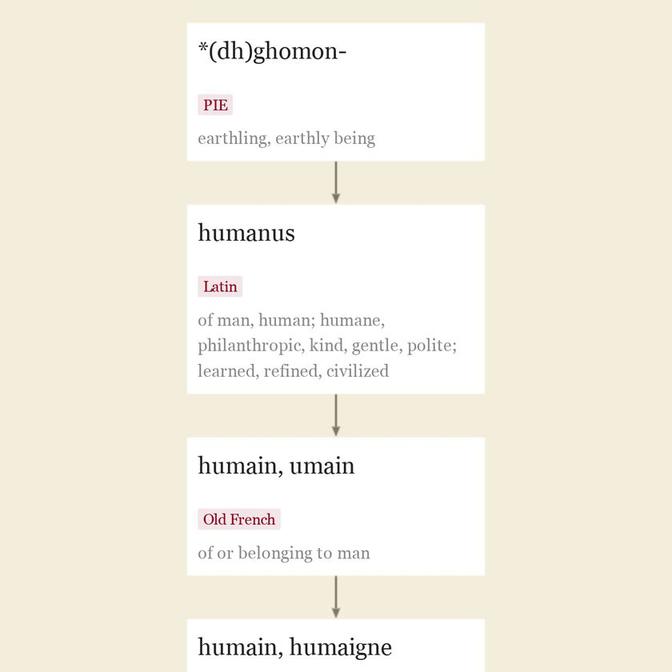humanity (n.)
14世纪晚期,“友善,亲切,礼貌; 关心他人”,源自古法语 humanité, umanité “人性; 人类,地球上的生命; 怜悯”,源自拉丁语 humanitatem(主格 humanitas)“人性; 人类,人类; 人道主义行为,慈善,仁慈; 良好的教养,文雅”,源自 humanus(参见 human(形容词))。“人性,人类形态,人类状态或人类品质”的意义约为1400年; “人类种族,人类总体”记录于15世纪中期。
humanity 的相关词汇

15世纪, humain, humaigne,“人类的”,源于古法语 humain, umain(形容词)“属于人类的”(12世纪),源于拉丁语 humanus “属于人的,人类的”,也意味着“人道的,慈善的,友好的,礼貌的,有学识的,文明的”。这部分源于 PIE *(dh)ghomon-,字面意思是“人类,尘世的生灵”,是与众神相对的(源自根 *dhghem- “大地”),但其中涉及到的声音变化没有确定的解释。与此相比,希伯来语 adam “男人”,源于 adamah “土地”。与古立陶宛语 žmuo(宾格 žmuni)“男人,男性”同源。
Human interest 来自于1824年。Human rights 早在1680年代已有记载; human being 则出现在1690年代。Human relations 源于1916, human resources 出现于1907年,美国英语,显然最初来自于社会基督教徒,基于 natural resources。Human comedy “人类活动的总和”翻译自法语 comédie humaine (Balzac); 参见 comedy。
1702年; humanity(名词)的复数形式,该词在英语中自15世纪末就被用于“与人类文化有关的学科类别”(在不同的时期与 divinity 或 sciences 相对)。拉丁语 literae humaniores,意为“更人性化的研究”(字面意思是“文学”),人们认为这些学科(古典文学、修辞学、诗歌)因其影响而趋于人性化或精致,但这种区别更多是指世俗话题与神圣话题的区别(literae divinae)。
From the late Middle Ages, the singular word humanity served to distinguish classical studies from natural sciences on one side and sacred studies (divinity) on the other side. ... The term's modern career is not well charted. But by the eighteenth century humanity in its academic sense seems to have fallen out of widespread use, except in Scottish universities (where it meant the study of Latin). Its revival as a plural in the course of the following century apparently arose from a need for a label for the multiple new 'liberal studies' or 'culture studies' entering university curricula. [James Turner, "Philology," 2014]
从中世纪晚期开始,单数词 humanity 用于区分古典研究与自然科学以及神圣研究(divinity)之间的差异。...这个词的现代用法并没有很好地被记录。但是到了18世纪, humanity 在学术意义上似乎已经不再广泛使用,除了苏格兰大学(在那里它指的是拉丁文学习)。在随后的一个世纪中,它作为复数形式的复兴显然是由于需要一个标签来标识进入大学课程的多个新的“自由学科”或“文化研究”。[詹姆斯·特纳,“语言学”,2014年]